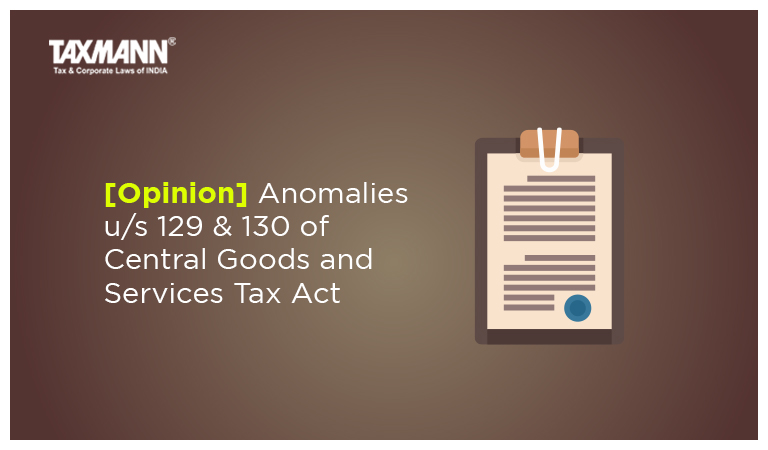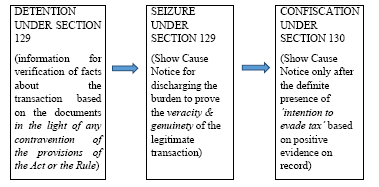[Opinion] Anomalies u/s 129 & 130 of Central Goods and Services Tax Act
- Blog|News|GST & Customs|
- 4 Min Read
- By Taxmann
- |
- Last Updated on 27 August, 2022

Adv. Prateek Gupta & Adv. Bharat Agarwal – [2022] 141 taxmann.com 435 (Article)
The title of section 129 of the CGST Act, 2017 clearly specify & indicate that it provides for detention, seizure and release of goods and conveyances in transit; on the other hand, the title of section 130 talks about confiscation of goods or conveyances and levy of penalty. For the purpose of invoking section 129 of the GST Act, all that is required is ‘contravention of the provisions of the Act or the Rules’, whereas specific circumstances are set out in sub-section (1) of section 130 of the GST Act, 2017 for invoking the provisions relating to confiscation which fundamentally requires the presence of ‘intent to evade payment of tax’. In such circumstances, in all cases, without application of logical mind & wisdom as well as without any justifiable grounds & reasons to believe, the Mobile Squad Authorities may be justified to straightway issue a notice of detention and seizure of goods and conveyances in transit under section 129 of the GST Act, 2017.
Since, detention & seizure of goods and confiscation of goods has been differently envisaged in the GST law by providing separate & dedicated provisions of section 129 and section 130 respectively; so it can be reasonably observed that ‘detention’ may lead to ‘seizure’ and then ‘seizure’ may lead to ‘confiscation’ of goods, thus ‘seizure’ is logically a step prior to ‘confiscation’. For the purpose of issuing a notice of seizure under section 129 which is leading to confiscation under section 130, the case has to be of such a nature that on the face of the transaction, the Mobile Squad Authority concerned is convinced as a ‘reasonable belief’ that the contravention is with a definite ‘intent to evade payment of tax’.
The goods are subjected to detention, seizure and confiscation in a sequence under Section 129 and section 130 of the GST Act, 2017 which could be chronologically understood as per the following table:

It may be noted that just for the reason of minor procedural lapses which might have occurred due to human error/mistake without any ‘intention to evade tax’, goods are being subject to ‘detention’ and ‘seizure’ as per the present provisions of Section 129 of the GST Act, 2017 and penalty is being imposed for trivial reasons. The Controlling Authorities or even the first Appellate Authorities within the CGST/SGST Departments are not even proceeding to apply their mind and wisdom to distinguish as to whether the default or so-called contravention if any may really lead to any monetary advantage to the taxpayer or whether the transaction is really a genuine & legitimate transaction because they have not to examine and decide whether there is any presence of ‘intention to evade tax’ in the questioned transaction. This situation is creating large number of disputes all over the country and huge amount of scarce money of the taxpayer is being blocked in penalty payment for release of Goods & Conveyance in transit. Further, non-availability of GST Tribunal is creating great trouble, as every small matter which is totally factual in nature gets subject to litigation before Hon’ble High Courts resulting in unwanted burden and pendency before Hon’ble High Courts.
Circular No. 64/38/2018-GST dated 14.09.2018 issued by CBIC, wherein directions had been given in very few listed circumstances in which proceedings under Section 129 of the CGST Act must not be initiated which may have occurred due to human error/mistake in the documents, this supports the view that large number of seizure of Goods are being made for inconsequential & frivolous reasons. The relevant extract is as under:
Further, in case a consignment of goods is accompanied with an invoice or any other specified document and also an e-way bill, proceedings under section 129 of the CGST Act may not be initiated, inter alia, in the following situations:
(a) Spelling mistakes in the name of the consignor or the consignee but the GSTIN, wherever applicable, is correct;
(b) Error in the pin-code but the address of the consignor and the consignee mentioned is correct, subject to the condition that the error in the PIN code should not have the effect of increasing the validity period of the e-way bill;
(c) Error in the address of the consignee to the extent that the locality and other details of the consignee are correct;
(d) Error in one or two digits of the document number mentioned in the e-way bill;
(e) Error in 4 or 6 digit level of HSN where the first 2 digits of HSN are correct and the rate of tax mentioned is correct;
(f) Error in one or two digits/characters of the vehicle number.
On perusal of the above, there have been some instances wherein the Circular of CBIC itself says that proceedings under Section 129 of the CGST Act, 2017 could not be initiated. But still there are many other similar circumstances wherein Seizure are being done without any justifiable reason, the presence of ‘intention to evade tax’ in the transection of supply of goods must be the mandatory requirement for any action of ‘seizure’ of Goods in Section 129 as has already been prescribed the related provision for ‘confiscation’ of Goods in Section 130 of the GST Act, 2017.
In our article, it is an endeavour to highlight the certain anomalies in Section 129 and Section 130 of the GST Act, 2017.
Click Here To Read The Full Article
Disclaimer: The content/information published on the website is only for general information of the user and shall not be construed as legal advice. While the Taxmann has exercised reasonable efforts to ensure the veracity of information/content published, Taxmann shall be under no liability in any manner whatsoever for incorrect information, if any.

Taxmann Publications has a dedicated in-house Research & Editorial Team. This team consists of a team of Chartered Accountants, Company Secretaries, and Lawyers. This team works under the guidance and supervision of editor-in-chief Mr Rakesh Bhargava.
The Research and Editorial Team is responsible for developing reliable and accurate content for the readers. The team follows the six-sigma approach to achieve the benchmark of zero error in its publications and research platforms. The team ensures that the following publication guidelines are thoroughly followed while developing the content:
- The statutory material is obtained only from the authorized and reliable sources
- All the latest developments in the judicial and legislative fields are covered
- Prepare the analytical write-ups on current, controversial, and important issues to help the readers to understand the concept and its implications
- Every content published by Taxmann is complete, accurate and lucid
- All evidence-based statements are supported with proper reference to Section, Circular No., Notification No. or citations
- The golden rules of grammar, style and consistency are thoroughly followed
- Font and size that’s easy to read and remain consistent across all imprint and digital publications are applied



 CA | CS | CMA
CA | CS | CMA
